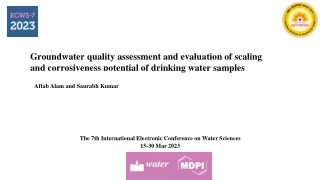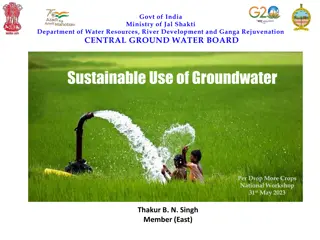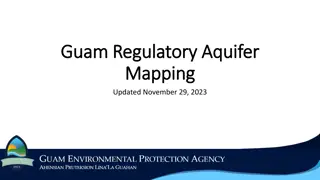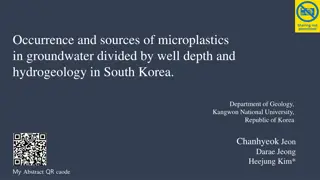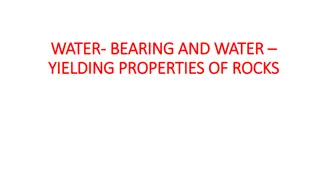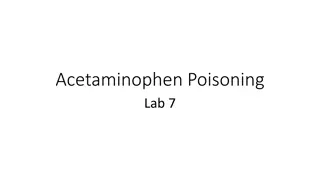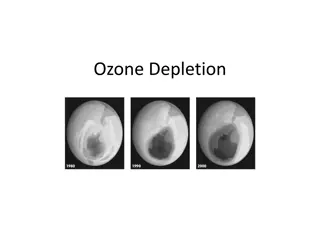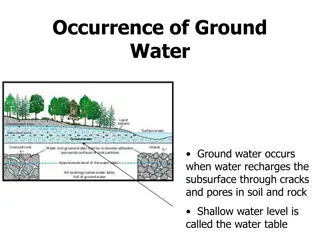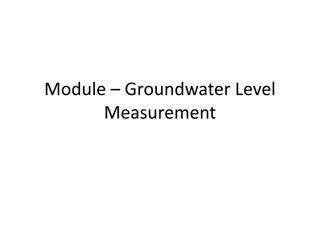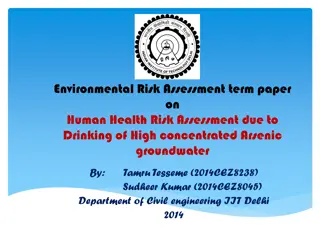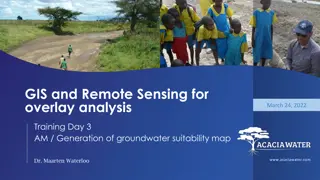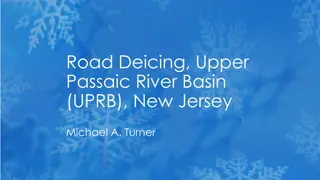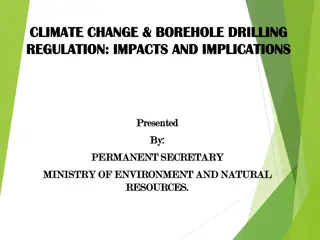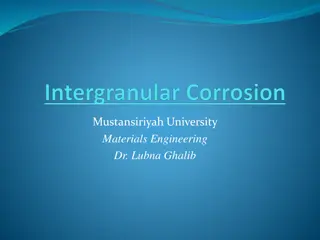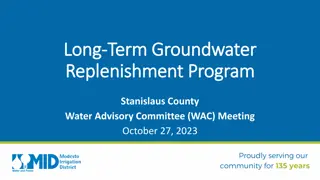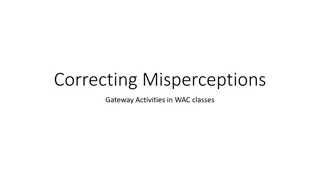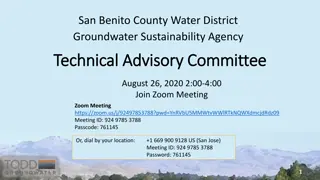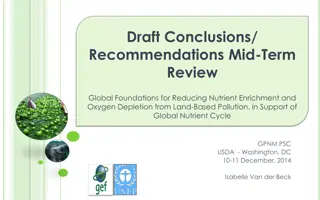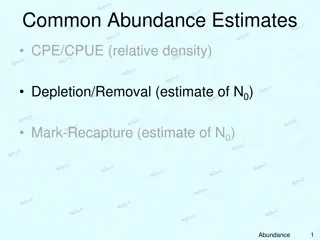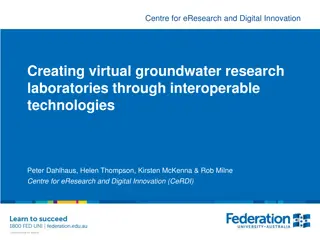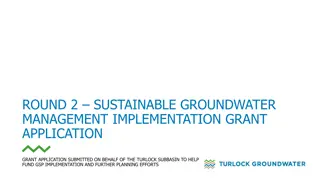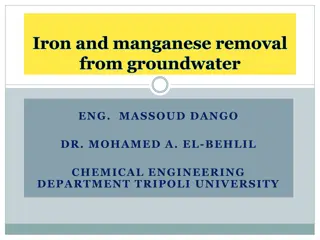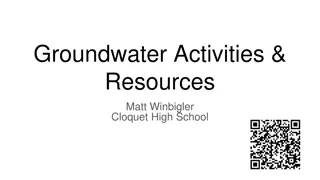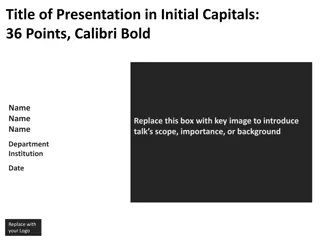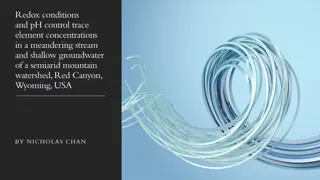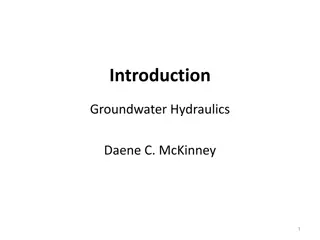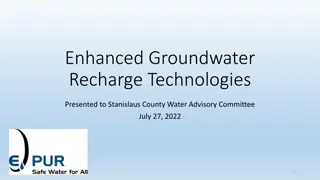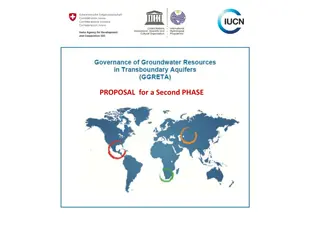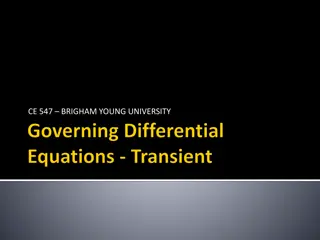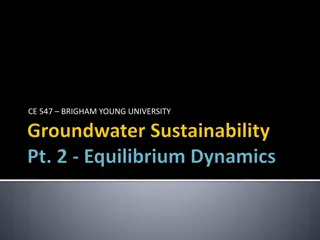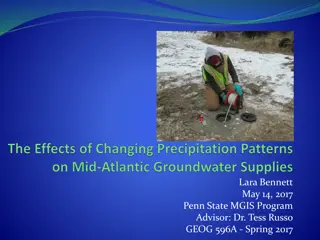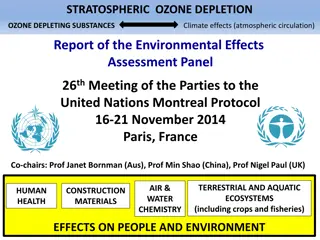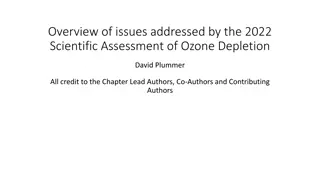Groundwater Quality Assessment & Corrosiveness Evaluation
Explore groundwater quality using WQI & corrosion indices. Study in Bihar, India aids in sustainable management approaches.
0 views • 14 slides
Understanding the Economic and Health Impacts of Groundwater Nitrate Contamination in Nebraska
The economic and health costs of groundwater nitrate contamination in Nebraska highlight the challenges of ensuring safe drinking water. Despite largely safe levels, proactive strategies are essential due to rising nitrate levels and costly maintenance efforts. The compliance record shows progress i
0 views • 18 slides
Sustainable Use of Groundwater
Groundwater management and sustainable use are crucial in India, as highlighted by the Ministry of Jal Shakti. The country faces challenges such as declining groundwater levels, quality deterioration, and increasing demand-supply gaps. Effective strategies and responsible practices are needed to add
0 views • 20 slides
Overview of Guam Regulatory Aquifer Mapping and Groundwater Protection
Guam's Regulatory Aquifer Mapping includes conflicting maps from USEPA, the Northern Guam Lens Study, and Groundwater Protection Zones, impacting land use regulations and water quality standards. Issues arise from inconsistencies in regulatory tools and language errors within the protection zones. Z
2 views • 19 slides
Understanding the Water Cycle and Its Importance in Nature
Water is essential for all life on Earth, continuously moving through different physical states in a cycle that has been occurring for over 4 billion years. The Water Cycle involves processes like evaporation, transpiration, condensation, precipitation, and collection, ensuring water is always movin
11 views • 7 slides
Groundwater Recharge Station Project
The Groundwater Recharge Station Project, Project Number 21-381, at California State University, Stanislaus involves the construction of a groundwater recharge station. The notice to contractors provides details on bid proposals, project scope, budget estimate, project duration, and prequalification
0 views • 19 slides
Microplastic Occurrence in South Korean Groundwater by Well Depth and Hydrogeology
The study conducted by Kangwon National University in South Korea analyzed microplastic occurrence in groundwater from wells of varying depths and hydrogeological settings. Samples were collected from the National Groundwater Monitoring Network pipes in Gapyeong and Chuncheon. Water type analysis re
7 views • 6 slides
Understanding the Water Bearing and Yielding Properties of Rocks
This informative content delves into the significance of porosity and permeability in rock formations, detailing primary and secondary porosity types, factors influencing porosity, and the concept of Darcy's Law governing groundwater flow. It emphasizes the relationship between effective porosity, r
1 views • 13 slides
Understanding Acetaminophen Poisoning: Mechanism, Toxicity, and Treatment
Acetaminophen poisoning occurs when the body is overwhelmed by high doses of the drug, leading to liver toxicity and potentially fatal consequences. The mechanism of toxicity involves the depletion of glutathione and the formation of a harmful metabolite, N-acetyl-para-benzoquinoneimine (NAPQI). Con
0 views • 9 slides
Understanding Ozone Depletion: Causes and Impact
The ozone layer, found in the stratosphere at 15 to 40 km altitude, plays a crucial role in absorbing harmful ultraviolet radiation. However, due to the use of Chlorofluorocarbons (CFCs), the ozone layer has been depleted, leading to the formation of the ozone hole. This depletion is caused by chemi
0 views • 27 slides
Understanding Groundwater: Occurrence, Recharge, and Movement
Groundwater occurs when water seeps into the subsurface through cracks and pores in rocks and soil, forming the water table. Recharge happens naturally through processes like precipitation and snowmelt, as well as artificially through methods like recharge wells and water spread over land. The movem
0 views • 8 slides
Understanding Groundwater Level Measurement Technologies
Groundwater levels are commonly measured using submersible pressure transducers, with data loggers used for monitoring and recording. Different options such as vented vs. non-vented systems, battery voltage considerations, and specifications for pressure sensors are discussed. Additional equipment l
0 views • 12 slides
Human Health Risk Assessment due to High Concentrated Arsenic in Groundwater
This term paper focuses on assessing human health risks associated with elevated levels of arsenic in drinking groundwater. Various exposure routes and sources of arsenic contamination are investigated, leading to a comprehensive risk assessment. The results indicate non-carcinogenic effects and pot
0 views • 6 slides
Groundwater Suitability Mapping Training Overview
The training program focuses on GIS and Remote Sensing for overlay analysis, with an emphasis on generating groundwater suitability maps. Dr. Maarten Waterloo leads the session, covering topics like data processing, automation, and sensitivity analysis. The program includes hands-on activities and e
0 views • 14 slides
Impact of Road Deicing Salts on Water Quality in Upper Passaic River Basin
An in-depth geochemical analysis conducted by Dr. Michael A. Turner and Dr. Duke U. Ophori studied the impact of road deicing salts on groundwater quality in the Upper Passaic River Basin, New Jersey. The study focused on major ions in groundwater, statistical analysis of ion concentrations, correla
0 views • 19 slides
Impacts and Implications of Climate Change on Groundwater Resources
Climate change has significant effects on groundwater resources, impacting storage, abstraction, and regulation. These impacts lead to challenges in water supply management, with implications on socio-ecological activities such as water stress, drought, and disease outbreaks. Understanding these con
0 views • 44 slides
Surface Water-Groundwater Interactions and Nitrogen Cycling in a Tidally Influenced River Study
Study on the dynamic interactions between surface water and groundwater in a tidal river, focusing on nitrogen cycling. The research highlights the impact of tidal fluctuations on bank storage, nitrogen transformation, and nutrient cycling. Findings suggest that river discharge affects the exchange
1 views • 16 slides
Understanding Intergranular Corrosion and Sensitization in Materials Engineering
Intergranular corrosion (IGC) is a type of corrosion that targets the boundaries of crystallites in materials, making them more vulnerable to corrosion. This phenomenon, caused by impurities, enrichment, or depletion of alloying elements at grain boundaries, can lead to material degradation. Sensiti
0 views • 10 slides
Sustainable Groundwater Management in Stanislaus County: A Comprehensive Overview
Long-term groundwater replenishment programs, pumping policies, and the Sustainable Groundwater Management Act (SGMA) are crucial for managing water resources in Stanislaus County. The Modesto Irrigation District's (MID) efforts in conjunctive use, groundwater recharge projects, and public outreach
2 views • 10 slides
Understanding the Importance of Soil and Groundwater Measurements
Explore the significance of infiltration and hydraulic conductivity measurements in environmental studies, training sessions offered by Eijkelkamp Training & Consultancy, and various reasons for conducting measurements such as defining drain distance, disconnecting rainwater, soil and groundwater po
0 views • 55 slides
Addressing Misconceptions in Writing Across the Curriculum (WAC) Classes
WAC approaches in geology classes aim to correct persistent misconceptions through gateway activities, focusing on topics like CFCs and ozone depletion. By engaging students in discussions and written responses, educators correct prior misunderstandings to enhance learning outcomes and clarify disti
0 views • 6 slides
San Benito County Water District Groundwater Sustainability Agency Technical Advisory Committee Meeting Summary
The San Benito County Water District Groundwater Sustainability Agency Technical Advisory Committee met on August 26, 2020, to discuss various topics including update on GSP schedule, setting sustainability criteria, and monitoring for subsidence issues. The meeting highlighted the need for more sys
0 views • 33 slides
Understanding Ozone Depletion and Its Impact on the Environment
The stratosphere contains a vital layer of ozone that shields the Earth from harmful UV radiation. However, human activities, particularly the use of chlorofluorocarbons (CFCs), have led to the depletion of this protective ozone layer, especially over the poles. This thinning of ozone poses signific
0 views • 10 slides
Mid-Term Review on Nutrient Enrichment and Oxygen Depletion Reduction Strategies
The Mid-Term Review evaluated the effectiveness, efficiency, relevance, and sustainability of projects aimed at reducing nutrient enrichment and oxygen depletion from land-based pollution. Key findings highlighted successful pilot projects, the need for improved M&E reporting, and the importance of
0 views • 7 slides
Fisheries Abundance Estimates and Depletion Methods
Explore common abundance estimation techniques like CPUE, mark-recapture, and depletion methods. Understand how to calculate relative density, depletion estimates, and cumulative catch. Discover the concepts of N0, Nt, Ct, and q in depletion estimates using regression models. Learn about the assumpt
0 views • 10 slides
Virtual Groundwater Research Lab Solutions
CeRDI from the Centre for eResearch and Digital Innovation focuses on creating virtual groundwater research laboratories using interoperable technologies. They address challenges such as providing access to complex data, incorporating qualitative and quantitative data into models accurately, harness
0 views • 21 slides
Sustainable Groundwater Management Grant Applications Update
An update on the Round 2 Sustainable Groundwater Management Grants, including details on the grant application process, funding availability, application submissions, and project components. The applications are part of efforts to support sustainable groundwater management in the Turlock Subbasin an
0 views • 6 slides
Iron and Manganese Removal from Groundwater Study
Iron and manganese are common natural elements in groundwater, but their presence can lead to various issues such as metallic taste, staining of clothes and fixtures, and growth of iron bacteria. This study aims to analyze groundwater wells in Libya, identify high levels of iron and manganese, and p
0 views • 29 slides
Enhancing Flow Opportunities in Scott Valley Groundwater Study
The Scott Valley Groundwater Study identifies flow enhancement opportunities to improve water management and increase stream flows. Initiatives include developing an integrated hydrologic model, exploring water management strategies, and implementing groundwater recharge projects since 2008. The stu
0 views • 6 slides
Human Impacts on Groundwater Systems in Minnesota: A Study of Interactions and Solutions
Explore the intricate relationships between human activities and groundwater systems in Minnesota through investigations, models, and technological solutions. Utilize place-based evidence, including insights from Minnesota American Indian tribes and cultures, to understand and address climate change
0 views • 7 slides
Atmospheric Mercury Depletion Events in Arctic Regions
Explore the impact of atmospheric mercury depletion in polar regions during the Arctic spring. This presentation delves into the trajectory of mercury post-depletion, emphasizing environmental implications and mercury cycling theories. Discover how pollution in 53 streams is assessed and gain insigh
0 views • 17 slides
Redox Conditions and pH Control in a Mountain Watershed: Study in Red Canyon, Wyoming, USA
Exploring redox conditions and trace element concentrations in a semi-arid mountain watershed, this study in Red Canyon, Wyoming, delves into the impact of oxic surface water and anoxic groundwater on trace element cycling. The investigation aims to enhance understanding of seasonal variabilities, f
0 views • 11 slides
Understanding Groundwater Hydraulics and Hydrology
Explore the fundamentals of groundwater hydraulics and hydrology in this course, covering topics such as Darcy's law, aquifer testing, unsaturated flow, and more. Dive into practical applications and participate in a team project focusing on limiting hydraulic containment of contaminated aquifers. G
0 views • 25 slides
Enhanced Groundwater Recharge Technologies Overview
This presentation on Enhanced Groundwater Recharge Technologies covers a range of topics including background information, local assessments, groundwater recharge zones, and opportunities in Stanislaus County. It delves into various methods such as drywells, spreading basins, and aquifer storage, as
0 views • 9 slides
Enhancing Groundwater Governance and Cooperation in Phase 2 of GGRETA Project
The proposed Phase 2 of the GGRETA Project aims to improve groundwater governance, develop gender-responsive water approaches, and enhance cooperation on water security in countries like El Salvador, Honduras, South Africa, and others. The objectives include improving resource knowledge, fostering c
0 views • 5 slides
Understanding Groundwater Hydrology Concepts at Brigham Young University
Explore the derivation of transient terms, specific storage mechanisms, and distinctions between specific storage, storativity, and specific yield in groundwater hydrology. Delve into the mathematical equations governing groundwater flow and storage, understanding the change in mass stored in the sy
0 views • 17 slides
Understanding Groundwater Sustainability and Equilibrium Dynamics
This content delves into the concepts of groundwater sustainability, equilibrium, and capture in relation to groundwater management. It explores transitional storage, groundwater mining, and debunks the water budget myth. The images and explanations illustrate how pumping affects aquifers, the evolu
0 views • 11 slides
Exploring the Critical Relationship Between Climate and Groundwater
Investigating groundwater as a vital global resource, this study delves into the profound impact of climate change on groundwater levels and quality. Highlighting challenges and solutions, it emphasizes the urgent need for sustainable groundwater management practices.
0 views • 21 slides
Impacts of Stratospheric Ozone Depletion on Ecosystems and Human Health: 2014 Assessment Report
Significant scientific advances in understanding the effects of stratospheric ozone depletion on ecosystems and human health were presented in the 2014 Assessment Report. The report assessed research covering various subject areas and highlighted the increased UV-B radiation levels due to ozone depl
0 views • 20 slides
Insights from 2022 Scientific Assessment of Ozone Depletion
The 2022 Scientific Assessment of Ozone Depletion, led by David Plummer, addresses key issues like Ozone Depleting Substances, HFCs, Global and Polar Stratospheric Ozone, Climate Impacts, Stratospheric Aerosol Injection, and more. Chapter details reveal decreasing trends in Ozone Depleting Substance
0 views • 12 slides
